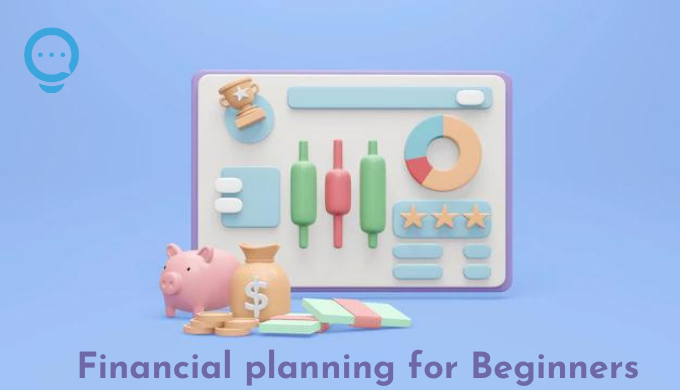Financial planning is a process that provides you with a framework for attaining your life objectives in an organized and planned manner while avoiding surprises and shocks. It has goals such as determining capital requirements, developing financial regulations, and ensuring that finite financial resources are used efficiently.
It is difficult to instil the habit of financial planning for beginners. However, when they volunteer to arrange their money, they have no idea where or how to begin. Here are ten golden principles to follow to properly arrange one’s money.
Money Management

Managing one’s finances does not have to be tedious. It’s not rocket science, and you don’t have to come from a financial background. You simply need to be a little bit committed.
Deciding to conserve money is the first step toward financial management. Saving money may be a significant step toward financial freedom. Consider borrowing from a buddy for that last-minute doctor’s appointment!
If you don’t have any pals, you may be forced to use your credit card. And you already know that credit card debt is the most costly type of debt. Repeat this a couple more times, and you’ll find yourself in a financial trap before you realize it.
You may have several financial objectives in mind. Such as purchasing a car, the latest smartphone, or accumulating riches. You need money in all of these circumstances. But from where will it come? You must have savings!
Saving money keeps you from getting into debt. Not only that, but systematic saving consistently may make you wealthy. You may be able to meet your financial objectives on time.
You may be wondering how to save money at this point. And, maybe, more importantly, how much money should be saved? As soon as you get your paycheck, start categorizing it. These categories include expenses, EMIs, investments, and savings.
Make it a habit to save at least 10% of your monthly income. It really can be that simple! However, do not deposit it in a piggy bank. Money sitting in a piggy bank does not grow. Even a savings account may not yield greater yields.
Instead, you may put this money into a liquid fund. A liquid fund is a form of mutual debt fund that invests money in fixed-income generating instruments such as FDs, commercial paper, certificates of deposit, and so on at roughly 4%. Invest your savings every month over a lengthy period and discover what it can achieve for you!
Also read – 6 Financial lessons to lern form Squid Game.
Spend your money wisely.

If you’re living paycheck to paycheck and finding yourself short on cash even before the end of the month, you’re probably living much beyond your means. Perhaps there are a lot of unanticipated bills! These may leave you with insufficient funds to meet your basic needs. But there is an escape route.
Try making a budget. You won’t be able to govern your financial flows until you establish a budget. A budget simply indicates how much money is coming in and how that money is spent.
Begin by classifying your spending as fixed and variable; urgent and non-urgent; essentials and luxury; avoidable and unavoidable. In this manner, you will have a complete inventory of spending in front of you. The more you turn things from abstract to concrete, the easier it is to grasp them.
You may list needs and prioritize which ones to handle first. It all comes down to prioritization. You must understand that you have limited resources and boundless desires.
However, you must manage your resources. The sooner you understand this reality, the better you will be able to resist your inclinations toward unnecessary spending.
After you’ve covered all of your basic bills, you may set aside some funds for amusement and pleasure. You may minimize overpaying by making a grocery list before going to the department shop. You can also designate a weekday as a no-spend day.
Make a firm commitment to your budget. Consider it a commitment rather than a burden, and stick to the rules.
Keep a personal balance sheet.

A personal balance sheet can help you keep track of what you own and owe! It’s a very effective tool for taking your finances to the next level.
It is a statement in which you can list your assets and liabilities. Your net worth is determined by the difference between your assets and liabilities.
Gather your bank statements and other proofs of liabilities before you begin. Then, make a list of your assets, such as your bank balance, investments, home value, and the value of other assets. To determine the total value of your assets, add up all of your assets.
List your liabilities, such as your car loan, home loan, credit card balances, and remaining balances on other loans. The total of your liabilities will reveal the amount of money you owe.
Ideally, your net worth should be positive, which means that your own money exceeds the money you owe. Don’t give up if the news is bad. Your net worth will gradually increase as you continue to repay your loans.
Another critical aspect of asset management is determining what types of assets you need to own. You should always try to own assets that appreciate value while requiring little maintenance. In the end, it all comes down to how much you can use.
Simply accumulating things you don’t need leads to money being trapped in unproductive activities. It’s a good idea to know what you use and what you can get rid of.
Prudent handling of surplus funds

Your future is determined by how you handle excess cash. You are more likely to overspend if you do not have a plan. This money could have been used to help you achieve financial independence.
Your future is determined by how you handle excess cash. You are more likely to overspend if you do not have a plan. This money could have been used to help you achieve financial independence.
With each passing year, everything becomes more expensive due to inflation. If you do not invest, your money will not grow to cover the inflationary gap. Otherwise, you might not be able to retire as soon as possible.
Investing can be a great way to channel extra cash while combating inflation. It can be used to increase wealth and redirect it toward goal achievement. The sooner you begin investing, the better. Investing can help you get from where you are to where you want to go.
Begin by identifying goals, such as purchasing a car or planning for retirement. Divide your objectives into two categories: short-term and long-term.
Short-term goals are those that can be accomplished in one to three years.
Medium-term goals are those that require a time horizon of 3-5 years. Long-term goals that will take more than 5 years to achieve.
Determine your risk tolerance or the extent to which you are willing to accept a drop in the value of your investments. If you can stomach a 20% drop in the value of your investments, you are a high-risk seeker. Otherwise, consider yourself a risk-averse investor.
Once you’ve determined your objectives and risk tolerance, you can easily choose an investment haven. A risk-taking investor may prefer a diversified equity fund. A risk-averse short-term investor, on the other hand, may prefer a liquid fund or a balanced fund.
Mutual funds have emerged as the most adaptable investment vehicle. You can begin a Systematic Investment Plan (SIP) with a monthly investment of Rs 500. SIP deducts a fixed amount from your savings account and invests it in a mutual fund scheme of your choice.
Make your own personal investment Portfolio

Creating your first investment portfolio is a significant accomplishment in and of itself. After all, it is your first step toward accumulating wealth. Building a portfolio entails dividing your investment into asset classes such as equity, debt, and cash. It is referred to as asset allocation.
Although equity is the best tax-efficient and inflation-fighting vehicle, putting all of your money into inequity is not a wise investment strategy. You must diversify the funds that will be allocated to each asset class in accordance with your investment objectives. It is always better to be a long-term investor to build a larger corpus.
Your investment horizon should be between 10-and 15 years. Once you’ve built a portfolio, you’ll need to rebalance it regularly to keep the portfolio’s risk within expected limits due to market fluctuations. You can do it every six months or once a year.
Retirement Planning

Everyone should plan for their retirement. You are more susceptible to diseases such as diabetes, hypertension, and heart attacks due to your sedentary lifestyle. Healthcare costs continue to rise with each passing year. In the absence of a social security net, you must have your funds to cover these costs.
You, like many others, may believe that it is too early to begin planning. At this rate, you start retirement planning late and accumulate less than you could if you started earlier. The “magic of compounding” is responsible for this. It even allows you to retire early and live a stress-free life.
When planning for retirement, you should clarify a few points, such as the age you want to retire. Estimate how much money you will need each month to cover your post-retirement expenses.
Assume you plan to retire at 60, and your monthly estimated expenditure after retirement is Rs 50000. Assuming a 12% rate of return, you would need to contribute Rs 2,900 per month for 30 years to accumulate a corpus of Rs 1 crore. Using our retirement calculator, you can easily calculate your retirement contribution.
Debt should be managed wisely.

A lack of debt management may eat up a large portion of your pay. You may have to take out new loans to pay off old ones. If it spirals out of control, you may find yourself trapped in a vicious debt cycle. Your most important life goals may be put on hold, and your retirement may be postponed.
Making a plan for your debt repayment may keep you out of trouble. All you need to know is how much money you owe to whom. Make a plan for paying them off. If you have a lot of debt to pay off, start with the most expensive one first.
Credit cards are the most expensive type of debt. Pay off your credit card balances in full when your salary is credited each month. Don’t be swayed by the allure of paying off the minimum balance. Even before you know it, the interest rate will have risen to the point where it will consume all of your savings. Make it a point to only use your credit card in an emergency.
Debt should only be used as a last resort. Make down payments on your purchases as much as possible. If you have large-ticket loans, look into balance transfer options. You can transfer your loan to another bank that offers a lower interest rate. This method allows you to save a significant amount of money that would otherwise be spent on interest.
Borrowing for depreciating assets is never a good idea. Furthermore, tax-inefficient loans, such as personal loans, should be avoided to the greatest extent possible. To achieve your objectives, you can consider saving and building a corpus. You can avoid falling into a debt trap in this manner.
Make sure your risks are covered.

Human life and property are both at risk. These risks can result in income loss, putting you and your dependents in financial jeopardy. Insurance, like investing for wealth accumulation, ensures wealth preservation.
Purchasing a ULIP is only the beginning. You end up paying more and being underinsured. Rather, a term insurance policy would be a wiser investment. A term insurance policy offers higher risk coverage at a low cost.
Expect no returns on your life insurance policy. The sum assured should ideally be at least ten times your annual income. Before purchasing life insurance, you can compare policies online to find one that meets your needs at an affordable price.
Aside from life insurance, you may also require health insurance. It will give you access to high-quality healthcare at a reasonable cost. Don’t end up paying more for less.
Estate Preparation

Whether you believe it or not! Every one of us has a will. Whether it’s your car or your house, or the money in your savings and checking accounts, every asset constitutes an estate. It is up to you to decide what happens to these when the time comes.
You must ensure that the correct asset is correctly assigned to the correct individual. Finally, you should consider estate planning. People frequently believe that estate planning is only for the wealthy.
The reality, however, is quite the opposite. It applies to anyone who cannot afford to leave his assets in the hands of the unwanted after he is no longer present.
Most of us have probably never considered estate planning. Some of us may be putting it off until later. However, this is the wrong approach. You can begin estate planning as soon as you begin amassing assets.
You can begin by creating an inventory of your assets. Make a list of beneficiaries and the percentage of assets you want to give to them.
Prepare a will that will be in the best interests of your loved ones. It will ensure that the beneficiaries do not face any difficulties obtaining asset ownership. If you are unsure how to proceed, seek the advice of an experienced lawyer.
Organize your Taxes

You must examine your finances from the standpoint of tax efficiency. You can claim various tax exemptions, deductions, and benefits to reduce your tax liability at the end of the fiscal year.
Even though tax planning is entirely legal, you must not engage in tax evasion or tax avoidance. Several deductions are available under Sections 80C through 80U of the Income Tax Act.
Investing in an Equity Linked Savings Scheme is the most efficient way to utilise Section 80C. (ELSS). It has the shortest lock-in period compared to all other Section 80C tax-saving options.
You can save up to Rs.45,000 in taxes and claim a deduction of Rs.1.5 lakh under this section. Furthermore, ELSS is a diversified equity fund that can help you achieve your financial goals by investing in the stock market.
Conclusion
If you don’t know where to start, seek advice from a reputable source. You can also invest in mutual funds to benefit from diversification and professional fund management.




![RBI Approved Loan Apps in India: The Best Options for Instant Loans [Updated 2024] Best Options for Instant Loans 2023](https://infoshots.in/wp-content/uploads/2023/05/RBI-Approved-Loan-Apps-in-India.png)